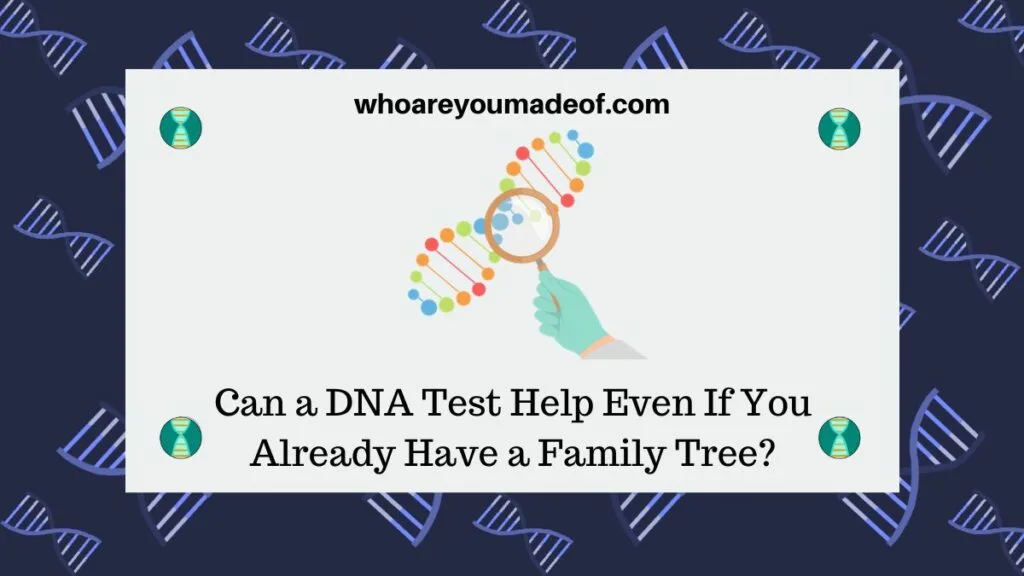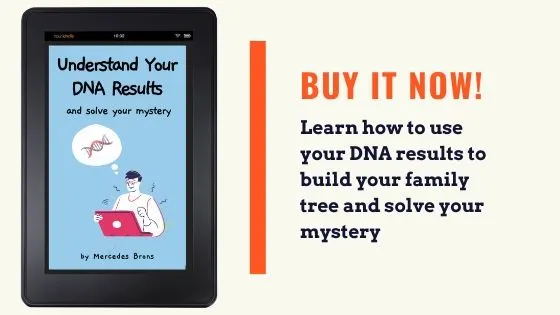If you have asked around about DNA testing for ancestry purposes, you may have heard someone explain that DNA results - and especially DNA matches - can be helpful for family tree research. What if you already have a big family tree? Can DNA testing still be helpful?

In this post, I will explain why DNA matches can still help even the most experienced genealogists with the most extensive family trees. You'll learn:
- How DNA can help you begin to verify your family tree research
- That DNA can help you break past those pesky "brick walls" in your research in ways that no other technique can
- Why DNA isn't a substitute for genealogy, but a useful tool for a genealogist
- What any genealogist needs to know about DNA testing for genealogical purposes
DNA matches can help you build a wide and complete family tree
If you are the type of person who wants to have a complete family tree that includes the siblings of your ancestors along with their descendants, you will find that your DNA matches will prove an excellent source of information.
Sure, we can traditional genealogy to determine - to a certain extent - who our third and fourth (and more distant) cousins are, or might be. DNA matches, however, will make it far easier to add branches to your tree that you might not even know exist.
For example, I just got a new DNA match this morning (97 centimorgans... exciting!). He shows up as an estimated third cousin match to me. I've never heard of his surname, though. After some checking, I realize that my mom's great-great grandmother's sister has a great-granddaughter who married a man with this name.
I still need to message my new match to confirm my theory, and then I will add this new branch to my tree. I'm looking forward to sharing information with him, too!
How DNA matches can help you break "brick walls" and verify your family tree research
While I was waiting for my DNA results to come back, I decided that I would try to figure out who my great-grandmother's (Emma) parents were. I only knew Emma's full name, and an approximate date and state of birth. I also remembered my mom telling me a story about her grandmother living in Rhode Island at some point.
Emma's ancestry was the most recent "brick wall" in my family tree. Emma's children, grandchildren, and great-grandchildren knew nothing about her except for those most basic details.
Using census data and vital records from New Jersey, the state of my great-grandmother's birth, I was able to find a family with the same surname, a child with the same name born around the year as Emma, with a parent who was born in Rhode Island.
Things looked really good for this being the right family for Emma, so I built her tree back a few generations further. Great, you say, but what does this have to do with DNA matches?
Emma has an exceptionally common surname, and the name "Emma" is a pretty common first name. There were several babies with her exact name born in the same county in New Jersey between 1903-1905, so how could I be 100% sure that I chose the right Emma (and corresponding ancestors) to put in my tree?
You guessed it! DNA matches were the key to helping me be as sure as anyone could possibly be that I had the right family for Emma in my tree.
When I first saw my DNA match list, I immediately noticed people with Emma's surname. They were second and third cousins to my mom, based on shared DNA and family trees, and checking through those trees, I realized that I had identified the correct family.
Since then, I have dozens more DNA matches on these lines of my mother's family tree that have continued to build a stronger case that my Emma is indeed descended from that family with a Rhode Island connection that I discovered on the US Federal Census.
Mystery solved.
DNA is a tool for genealogists, not a substitute for genealogy
You may have noticed that a lot of the more "typical" genealogy research was used in my example about how DNA matches can help you break through brick walls. More traditional genealogy research is crucial to effectively using information obtained from DNA matches.
Phrased more succinctly, we should think of DNA as a tool for genealogists. DNA cannot be a substitute for quality research, but it can be a very valuable bit of evidence to support the work that we do on our trees.
You might not think of yourself as a genealogist. It sounds so official, doesn't it? Anyone who spends time building their family tree is a genealogist. If you do it for free, you are an amateur genealogist. If you charge money for it, you are a professional genealogist.
What any family tree researcher needs to know about DNA testing for ancestry
My sincere hope by this point in the post is that you are considering taking a DNA test. If you've already taken a test, my goal is that you take a more serious look at your DNA matches with the understanding that they can be very helpful in your family tree research. Even if you already have a great family tree.
People who take a DNA test to help with family tree research should choose an autosomal DNA test provided by a company with a large database of customers who are likely to share family tree information. To take advantage of the power of DNA testing for genealogy, ideally we have access to a large database of potential DNA relatives with family trees.
Which company offers the best DNA test for family tree research?
As of right now, the best place to find a DNA that meets the requirement of a large database of potential relatives who also are more likely to share family tree information (since it is easily attached to their profile) is Ancestry DNA. Ancestry DNA has approximate twice as many DNA results in the database as the next biggest database. Additionally, the main focus of their site is family tree research, so people who have done tests with them can easily research and add a family tree.
The fun doesn't stop with just one DNA test
Once you've taken your Ancestry DNA test (or other DNA test), there is more to learn about all that DNA testing for genealogy has to offer. You can upload your DNA data to other sites to get more matches, do additional DNA tests to learn about your Y-DNA (males only) and mtDNA, and even learn about chromosome painting.
There is an entire world of genealogy that one simple DNA test can give you access to. It's quite amazing!
Conclusion
I hope that this post has helped you get some ideas as to how and why DNA matches can be helpful even if you have built a great family tree. If you have any questions about something that you read in this post, or would like to share how DNA matches helped you with your tree, I would love to hear from you in the discussion below.
Thanks for stopping by today!

